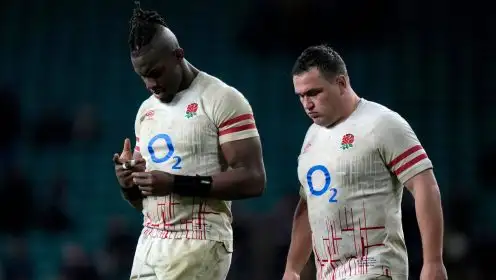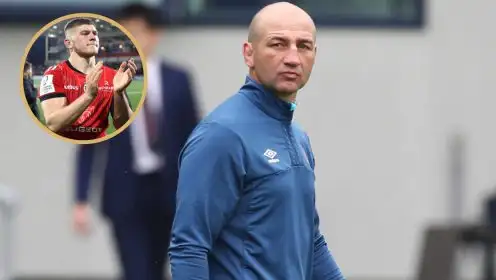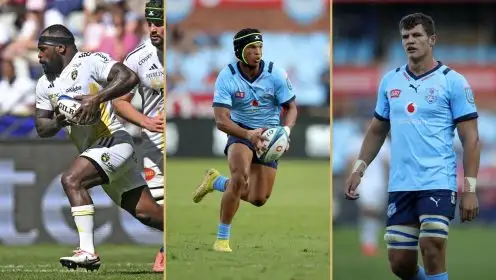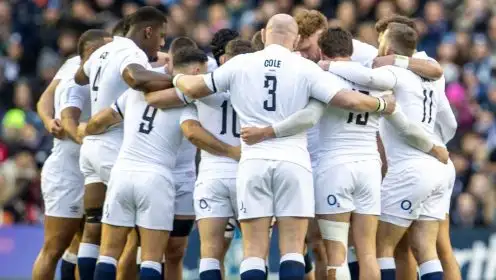Topsy Ojo exclusive: The ‘big difference’ that got England’s attack firing and backing it up against France

England's George Furbank , left, on his way to score a try during the Six Nations rugby union international match between England and Ireland with Tommy Freeman and a cut out of Topsy Ojo.
England delivered one of their most attractive and attacking performances against Ireland at Twickenham last weekend.
Following the showing of Steve Borthwick’s charges, James While caught up with former London Irish flyer Topsy Ojo to unpack the Red Rose’s attacking system.
Speed is all
“The biggest change we saw in England’s system and intent was the speed in everything they did; in both ruck and recycle, their speed to find space and then the fast hands and vision get the ball to space, it was all done as quickly as possible,” Ojo exclusively told Planet Rugby.
“Part of that was how well they ran their transition and counter-attacks. Ireland are masters at kicking long, but they’ll often keep it on the pitch and sit back for marginal territorial gain, knowing they’ve an outstanding lineout.
“England had the ability to reload four or five players back into the game to strike quickly, and if not break them in phase one or phase two, then win they won contact and reloaded into third and fourth phase. Their speed and fitness is key here, and that was very evident from the amount of numbers that they managed to get in support, and we saw that in both the first and third tries, both classic examples of counter-attack and two-phase scoring in transition, a coach’s dream.
“England were very cute about how they manipulated the point of attack to pick off the big front five forwards and make them isolated and vulnerable. When James Lowe kicked long on a couple of occasions, England managed to get Tadhg Furlong on the outside of the Irish defensive formation, defending the edge against fast attackers.
“Now, Tadhg is a world-class mobile prop, but you could see him looking around for people to come and support him, but England were quick enough and good enough to get up to Furlong, attacking him on both sides with support options left and right, a great example of playing what you see in front of you, and that’s when the gap opens up, as it did.”
Furbank key
Ojo believes that Borthwick’s bold decision to drop Freddie Steward from the starting full-back role and pack the multi-skilled, in-form George Furbank has paid off for England.
“If you look at that early try, George Furbank has to come from the far side of the pitch to join that attack; get there and then execute it – and it takes a huge amount of physical effort to do that. You’ve got to work hard to get yourself in a position to go and strike, but if you do that, the opportunities are there, and again, a part of that is England scanning to watch what’s happening in front of them,” he said.
Lawrence is in the corner! 🔥#GuinnessM6N #ENGvIRE pic.twitter.com/ruSXsej7el
— Guinness Men's Six Nations (@SixNationsRugby) March 9, 2024
“Furbank’s inclusion has made a big difference. This is no slight on Freddie Steward, as he is a world-class 15, but George has brought something completely new, and they have different strengths. I think what we’ve seen with George probably ties into what they’ve been doing in Northampton—the ability to just light up on counter-attack and on wider attack in general.
“He gets into good positions early and strikes with real pace and backs himself. He had a disappointing game against Scotland, despite some good moments, but it’s a mark of his character that he didn’t stop being him. He went and got his hands on the ball, and that’s to his credit.
“He possesses pace and precision, so when he comes into the line, it comes in at 100 miles an hour. He’s intuitive, and when he sees something, he goes for it, and he attacks it. Sometimes it comes off, and sometimes it doesn’t. But I think on Saturday, we saw more of it coming off than not, and that’s actually what he’s been doing in the Premiership week in and week out for Saints,” admired Ojo, a man who crossed for 80 Premiership tries in his time at London Irish.
Playmaking options
With Owen Farrell taking a break from international rugby and perhaps ending his Test career with a move to Racing 92, England were always going to be down a playmaker this Six Nations.
While Furbank’s inclusion has assisted George Ford, Ojo has highlighted other players who made Ford and Furbank’s job easier against Ireland.
“The other thing England did well, and Furbank was part of this with Ben Earl, is vary their options at first receiver,” he noted.
“George stands there a lot in the Premiership, and his experience of playing 10 means that he’s able to interchange when he needs to create options. So, if for whatever reason George Ford isn’t there, he’ll say, ‘Right, I’ll play first receiver for a few phases while you get yourself back into the mix’. You can be the second pair of eyes and we kind of operate together and see where the space is”.
“So, in that scenario, there’s no need for a forward to make a one-out carry as you’ve got a playmaker available for continuity. This really served England well, with Fordy often looping around into the centre channels to play off Furbank as a second distributor. This ensures that the phases continue but crucially do so at pace.
“We can’t overlook the role that the three big boys – George Martin, Maro Itoje, and Ollie Chessum – played in delivering this plan, playing together as a unit and alongside the physicality that Earl brings.
“Earl is also capable of filling in that almost number 10 role to crash the ball up at pace but with dangerous footwork, too. And that worked very, very well together in terms of winning the collision, but Earl did so with real gas and the ability to change direction into contact.”
England’s newest talisman dominates the Six Nations in key statistic
Back-row balance

England number eight Ben Earl.
“The shout to play those three big locks together was a crucial call, as having Chessum in the back-row alongside Earl at eight allows Ben to focus on his superpowers of pace and footwork,” Ojo added.
“And he brings so much to that position in terms of points of difference that he’s making the shirt his own. He sets the agenda with his intensity in carry, and that also continues to the work around clearing the breakdown. When you have someone like Earl delivering on that level, then it sets the standards, and the whole team rises to his example – leadership by deed and action.
“Those factors, especially the clearing, gave Alex Mitchell the ability to get superb momentum around the fringes, getting the ball away from those Irish hands that love to slow and create chaos so quickly that they’re unable to disrupt. And some of those hits from George Martin – he’s so intimidating, and he absolutely loves melting and folding anyone who comes his way – just ask Tadhg Beirne!”
Number crunch
With England heading to Lyon to tackle an under-pressure French side, Ojo backs the Red Rose to replicate their performance against Les Bleus, but they will need to overcome some obstacles to do so.
“England’s challenge now is how do they take the momentum they’ve created to Lyon and how do they overcome France? Ireland was the perfect storm in terms of motivation: Jamie George’s personal tragedy of losing his mum, the press writing them off, playing the best side in the world and some really intelligent selection from Steve Borthwick. All of that went into fuel that fire for what they delivered at the weekend,” the former winger said.
“You now don’t have all of that, but you’re going into another big game. So, how do you come down from the highs of that performance and capture the outcome?
“It’s about looking at what they did really, really well, and then making a positive mental commitment to yourself that we can actually take into the next game but also acknowledging it’s a different situation. England have a chance to win the championship, depending on how the Ireland v Scotland game goes, of course, but they’ll face a hostile environment in Lyon.
“That may work to their advantage – France haven’t been great, with a draw and a loss at home, and while they’re going to want to make a point to finish strong, the Lyon crowd won’t hold back if they falter.
“It’s about creating the same speed and control around the breakdown and winning the physical battle as well against the biggest side around. They’re going to have to last with France for 80; France have big men that start the game, and even bigger men finish the game, so there is a physical battle that needs to be won across the 80 minutes without any respite. Put yourself in a position to win the game and then go and do that, and actually not get too distracted by the stuff around like winning the championship. Those are the real challenges. And it’s probably, I’d say it’s more mental and emotional than actually physical preparation because of what they put in at the weekend.
Chris Robshaw’s Six Nations Team of the Week: Ben Earl the standout but Italy’s super six dominate
Emotional leadership
“Just finishing with that theme of emotional leadership, England were much better at reading the moment. The Henry Slade kick for corner when only four points down in the first half was a demonstration of this; England knew they were on the front foot and rather than take three, they played the odds, exactly right given their situation,” Ojo said.
“Jamie George has brought a real sense of enjoyment to the captaincy role, but when he went off, England continued in the same frame of mind – firstly with Ford as skipper and latterly with both Itoje and Chessum making the calls – but the key is they did so in the same voice and mindset that George had created – which shows Jamie’s influence.
“It will be another huge match; the fans’ expectations have raised a notch, but again, let’s judge the ambition and style they’re creating over and above the result – this team is heading in the right direction, and we all need to support their vision, whatever the outcome.”
READ MORE: ‘Let’s just stop there’ – England coach’s pointed response after Sir Clive Woodward’s Ireland claim



